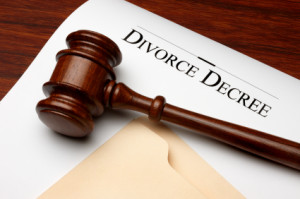How Can I Protect My Credit During a Divorce?
Table of contents
Divorce is a hectic time in which a family’s entire world is changing. Assets are being divided, custody over children and pets is being fought for, and figuring out the next steps once the divorce is finalized creates a lot of stress. The emotional turmoil of the previous life ending, along with any unresolved emotions, creates a chaotic period of one’s life where the real challenge of the day is just getting to the next one.
In the middle of all these changes, one thing that individuals might not take into consideration is their credit score. Unfortunately, many couples find themselves facing bills that have gone unpaid, credit cards that have been maxed out, and a communication breakdown that leads to the destruction of at least one of the spouse’s credit. With a tanked credit score, the unfortunate individual may find themselves facing an uphill battle to get their life back on track. However, it doesn’t have to be this way.
Alison Grant, Attorney at Law, has dedicated her life to helping the individuals of Lewisville, Texas, and the surrounding area, ensure that “starting over” after a divorce doesn’t mean starting from ground zero. With her compassionate and expert guidance through this dark transitional period, her clients have found themselves facing a much brighter and more stable future. In this article, Alison Grant gives tips on how individuals can be proactive and protect their credit score during a divorce. Here is what you need to know:
Understand What A Credit Score Is and Why It Matters
A credit score is a three-digit number that lenders, such as a credit card company or mortgage loan company, use to help them decide how likely an individual is going to pay a particular loan back. The credit score paints a picture of how high the risk of the lender losing the money they loan out. An individual’s credit score will dictate whether an individual can get a loan, how much the loan is, and how high the interest rate will be. Credit scores can also directly impact the likelihood of an individual getting into a particular apartment or a rental property.
The higher an individual’s credit score the higher the loan they will be able to receive and the lower the interest rate they have. Credit scores range between 300-850. Here is how the range is typically broken down:
- Poor: 300-579
- Fair: 580-669
- Good: 670-739
- Very Good: 740-799
- Exceptional: 800-850
It is important to remember that three different credit agencies have their own version of credit scores. (However, the scores are typically around the same ballpark.) The three major agencies are as follows:
Obtain Copies of Your Current Credit Report
The next step in being proactive about protecting your credit score during a divorce is to obtain copies of your current credit report from the 3 major credit agencies. It is impossible to know how else to protect your credit score without knowing where it currently stands.
Create a Debt Spreadsheet
Credit scores are typically gauged by the following five categories: payment history (35%), amounts owed (30%), length of credit history (5%), new credit (10%), and credit mix (10%). To keep better track of all the credit accounts you and your spouse currently have open, you will want to create a spreadsheet. This will help you understand who is invested in which account and give your divorce attorney a better understanding of where your finances/debts currently are.
You will want to begin by listing out all of the accounts that you currently have open. Then, for each entry, you will want to fill in the columns with the following information:
- Creditor name
- Contact information for the creditor
- The account number
- The type of account (car loan, mortgage, credit card, or student loan)
- Account status (current or past due)
- Account balance
- Minimum monthly payment amount
- Who is invested in the account
Create a Plan to Handle Your Debt
There are two types of credit accounts and each type is handled differently during a divorce. These types are known as a secured account and an unsecured account.
- Secured accounts are attached to an asset, such as a car loan or a mortgage on a home.
- Unsecured accounts are loans that are not attached to a particular asset, such as a credit card or a charge card.
How Are Secured Accounts Handled?
Community property, such as a house or car, is often divided during a divorce. If the property falls under separate property, (such as a home that was acquired by an individual before they were married), it will not be divided.
At the end of the divorce case, the judge will divide your property and any remaining debt by signing a Final Decree of Divorce. The Final Decree of Divorce will do the following:
- List the community property each spouse will keep, or, in some cases, order community property to be sold and say how the proceeds will be divided
- List the separate property of each spouse (if there is any)
For couples who just bought a house and are now facing a divorce, they have several different options. One of the best options is to simply sell the asset they have and use the money they get from the sale to pay off the loan. This way neither party’s name will be attached to the loan and they will be free from the risk of defecting on the loan because they can no longer make payments.
If the couple agrees that one individual should get the home, they can (with the court’s permission), refinance the loan so that the spouse who is keeping it will be the only name on the loan. This will relieve the other individual from any responsibility to repay the loan. (However, it is important to note that this will only work if the individual keeping the home can qualify for the loan on their own and assume the payments).
Always discuss with your divorce attorney about what route will be best for you. In some cases, it may also be worth enlisting the aid of a mortgage professional to review the current home loan, and the equity that has been built, and help you determine whether keeping or selling the house is in your best interest.
How Are Unsecured Accounts Handled?
As with the secured accounts, the Final Decree of Divorce will have the judgment from the judge in which the debts of the couple will be divided by a spouse. This division will have each spouse being held responsible for paying the debts, attached to their name, listed on the decree.
When it comes to unsecured debts, though, individuals need to act quickly. It is important to know which spouse is going to be responsible for what debt. If one spouse is merely the signer of an account, it is important to remove their name immediately. This will ensure that they are not being held responsible for a debt that isn’t theirs.
If there is a joint account that both parties are vested in but it doesn’t have a balance, the account should be closed immediately.
For vested accounts that do carry a balance, the account should be frozen during the divorce process. This will ensure that neither spouse charges the account further.
Will The Final Decree of Divorce Dissolve Me Of Debts That My Spouse Owes?
No. Just because the Final Decree of Divorce lists your spouse as the individual responsible for paying the debt doesn’t mean that you are wiped of all legal responsibility for a jointly held account. If your name is on the account, the creditor may still come after you for payment if your ex-spouse doesn’t hold up their end of the deal. This is because when the account was opened and you signed your name to it, you agreed to be responsible for any debt that was accrued. A divorce decree will not nullify this agreement. You can, however, request to have your name removed from the account. Make sure you always save written confirmation of your removal from the account.
Stay On Top of Debt Payments
Ensuring that you are paying your loans and credit cards on time is paramount when protecting your credit score. One 30-day late payment can drop your credit score as much as 75 points. Make sure that you are refinancing with your ex-spouse any debts that were divided so that the individual who is not responsible for the payment is not held responsible for the other’s failure to pay.
Always Be Represented By a Knowledgeable Divorce Attorney
One of the worst things you can do for your credit score or the stability of your future after a divorce is to approach the divorce without any legal guidance. You will want a divorce attorney on your side to ensure that you are not being saddled with all of the debt and that all assets and debts are divided equally. Otherwise, your financial goals after your divorce will be in jeopardy.
Don’t allow your ex-spouse to cost you your future home, education goals, or the expansion of your business. Instead, put your faith in Alison Grant, Attorney at Law. She and her team ensure that your goals and interests are placed at the forefront of every decision. We help you navigate the various components of your divorce, and ensure the best outcome possible for you. Contact us today for more information.
Divorce and Finances FAQs:
You can protect your credit score during a divorce by doing the following:
-Minimize your debt as much as possible
-Create a new budget
-Remove your spouse from being an authorized user on your credit cards or freeze joint credit card -accounts
-Open individual accounts
-Keep an eye on your joint obligations to make sure you are not missing any payments during the divorce proceedings
Your credit score is based on the level of debt you have and your payment history. Things you can do to help rebuild your credit after a divorce are:
-Create or modify your budget
-Adjust to living on one income
-Review your credit report and cut financial ties with your spouse
-Put debts in your name only
-Remove authorized use by your ex-spouse on your credit cards
-Make sure to monitor all accounts and payments










